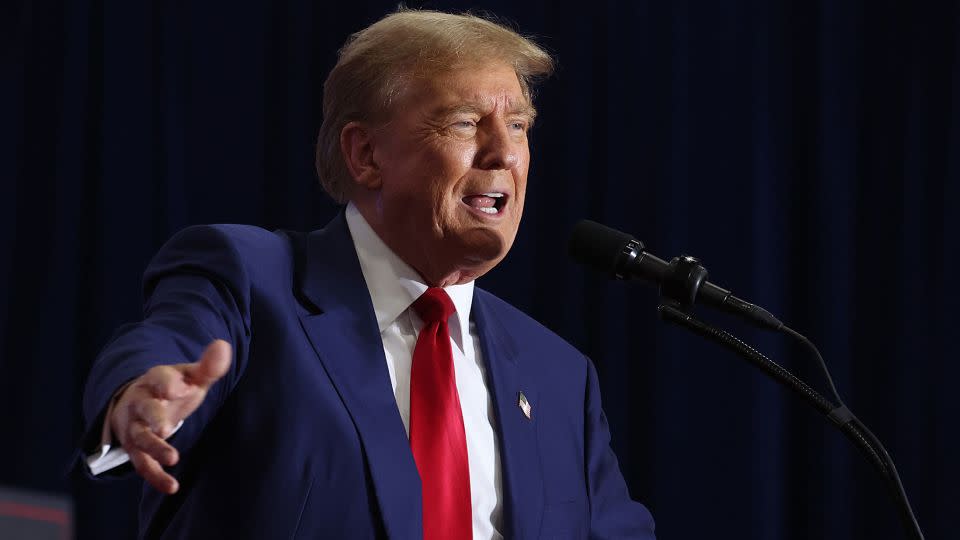Trump and allies pressure Nebraska to change how it awards electoral votes

- Oops!Something went wrong.Please try again later.
- Oops!Something went wrong.Please try again later.
- Oops!Something went wrong.Please try again later.
Former President Donald Trump and his allies have ramped up pressure for Nebraska lawmakers to change the method the state divvies out electoral college votes, an effort that underscores just how narrow the race for 270 electoral votes could be in the November rematch with President Joe Biden.
The proposed change would move the state to a winner-take-all allocation system from the current system that splits electoral votes between statewide winners and winners of congressional districts. The proposal appeared to have little traction until a last minute push by prominent Republicans placed national attention on the change.
Conservative activist Charlie Kirk kicked off the effort on Tuesday, sending a message on social media urging Nebraska Republicans to act. Hours later, Republican Gov. Jim Pillen voiced support for the change, after not making it a priority during his first 15 months in office.
Trump weighed in himself on Truth Social, saying that he too supported the change.
“Governor Jim Pillen of Nebraska, a very smart and popular Governor, who has done some really great things, came out today with a very strong letter in support of returning Nebraska’s Electoral Votes to a Winner-Take-All System,” the former president wrote. “Most Nebraskans have wanted to go back to this system for a very long time, because it’s what 48 other States do – It’s what the Founders intended, and it’s right for Nebraska. Thank you Governor for your Bold leadership. Let’s hope the Senate does the right thing. Nebraskans, respectfully ask your Senators to support this Great Bill!”
The Nebraska law dividing the state’s electoral votes by congressional district has not been a subject of serious discussion during the legislative session this year and was not a priority of Pillen until Trump’s allies began mounting a pressure campaign on Tuesday.
The sudden move, which caught Nebraska Republicans off guard, comes only two weeks before the state legislative session is scheduled to end April 18.
The speaker of the Legislature, Sen. John Arch, a Republican, seemed to close the door to acting on the matter this year.
“In the Nebraska Unicameral, we have a process,” Arch said in a statement Wednesday. “It includes bill introduction, a committee hearing on every bill and the prioritization of the session’s agenda by the committees and individual members of the Legislature. LB 764 was not prioritized and remains in committee. I’m not able to schedule a bill that is still in committee.”
It remains an open question whether pressure – from the governor or the public – can change his view.
Lawmakers opened a spirited debate Wednesday evening in the State Capitol in Lincoln about whether they should formally consider the winner-take-all measure by attaching it to another piece of legislation, a procedural move that would open the door to a likely filibuster from critics.
“When you realize you can’t win with the current rules, you go back to the drawing board to change the rules so you can win?” said Sen. Jen Day, a Democrat from Omaha.
While the legislature is technically non-partisan, the political lines became clear Wednesday night as the debate stretched on. Several lawmakers who rose in opposition to the proposal said there was nothing preventing Trump from winning the Omaha district, saying he has the same opportunity to make his case to voters as Biden does.
“Come take the electoral vote from Omaha,” said Sen. Megan Hunt, an independent from Omaha. “Come and earn it.”
Nebraska lawmakers rejected one attempt Wednesday night to attach the winner-take-all electoral vote measure to a broader government spending and policy bill.
Supporters said they would try again on Thursday to attach the Trump-backed proposal to another unrelated measure.
Nebraska and Maine are the only two states in the country that divide their electoral votes by congressional district – an unusual system that in 2020 allowed Biden to win one vote from Nebraska, a red state, and Trump to carry one from Maine, a blue state.
For all the last-minute bluster, it’s notoriously difficult to push legislation at the 11th hour in Nebraska’s unicameral legislature, the nation’s only one-house body of government. A Democratic lawmaker told CNN that a filibuster would be mounted if Republicans pushed the electoral college bill.
“Nebraskans want to keep our fair electoral system in place which is why previous attempts by some Republicans over the last 30 years have failed to undo our split electoral votes,” said Nebraska Democratic chair Jane Kleeb on Wednesday. “We are proud of our unique electoral vote system and know all too well the economic benefits it generates with a national focus on our state.”
There are only two days left in the session for new bills to be introduced. The proposal’s sponsor, state Sen. Loren Lippincott, had previously suggested the necessary votes weren’t there for his proposal to pass.
“In essence, for right now, it’s probably stalled in committee,” Lippincolt told the Lincoln Journal Star on Tuesday. “I don’t like to report that, but that’s the facts.”
Republicans have unsuccessfully tried to repeal this law before. A current proposal has been stuck in committee since 2023, without sufficient votes for a full vote, and it was barely discussed this year until Trump’s allies began pushing for the change this week.
For weeks, the Biden campaign has had its eye on Omaha and its one electoral vote.
For all the talk of Biden’s blue wall of Wisconsin, Michigan and Pennsylvania, winning all three could still leave him short of 270 electoral votes. The 2020 census changed the map based on decreasing populations in Pennsylvania and Michigan, so one of Nebraska’s three electoral votes could become critical should there be a 269-269 tie with Trump.
This story has been updated with additional developments.
For more CNN news and newsletters create an account at CNN.com

